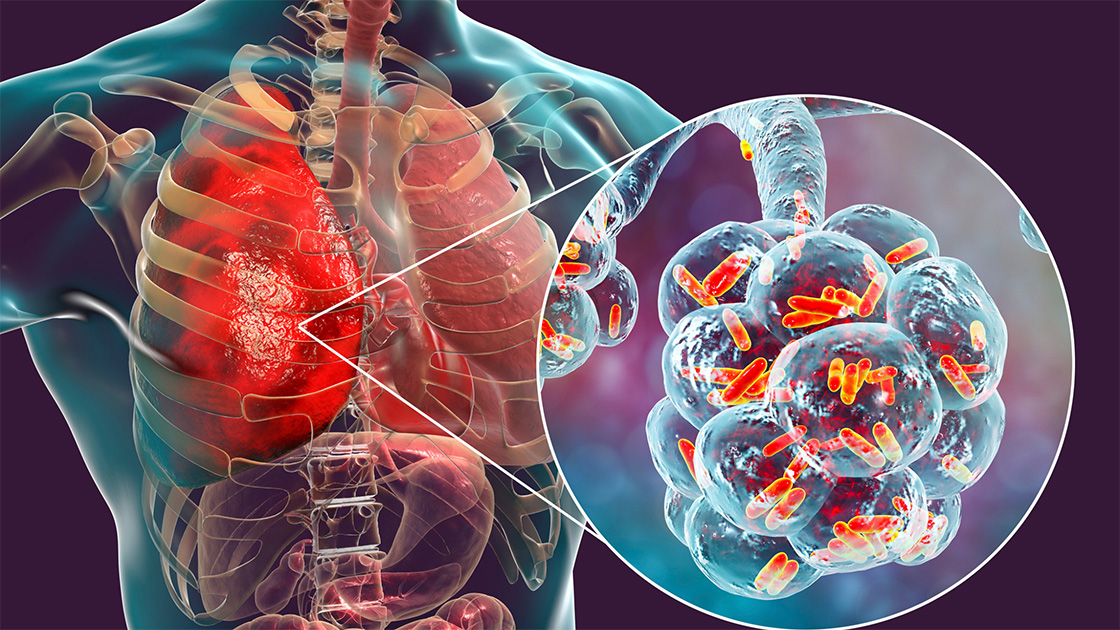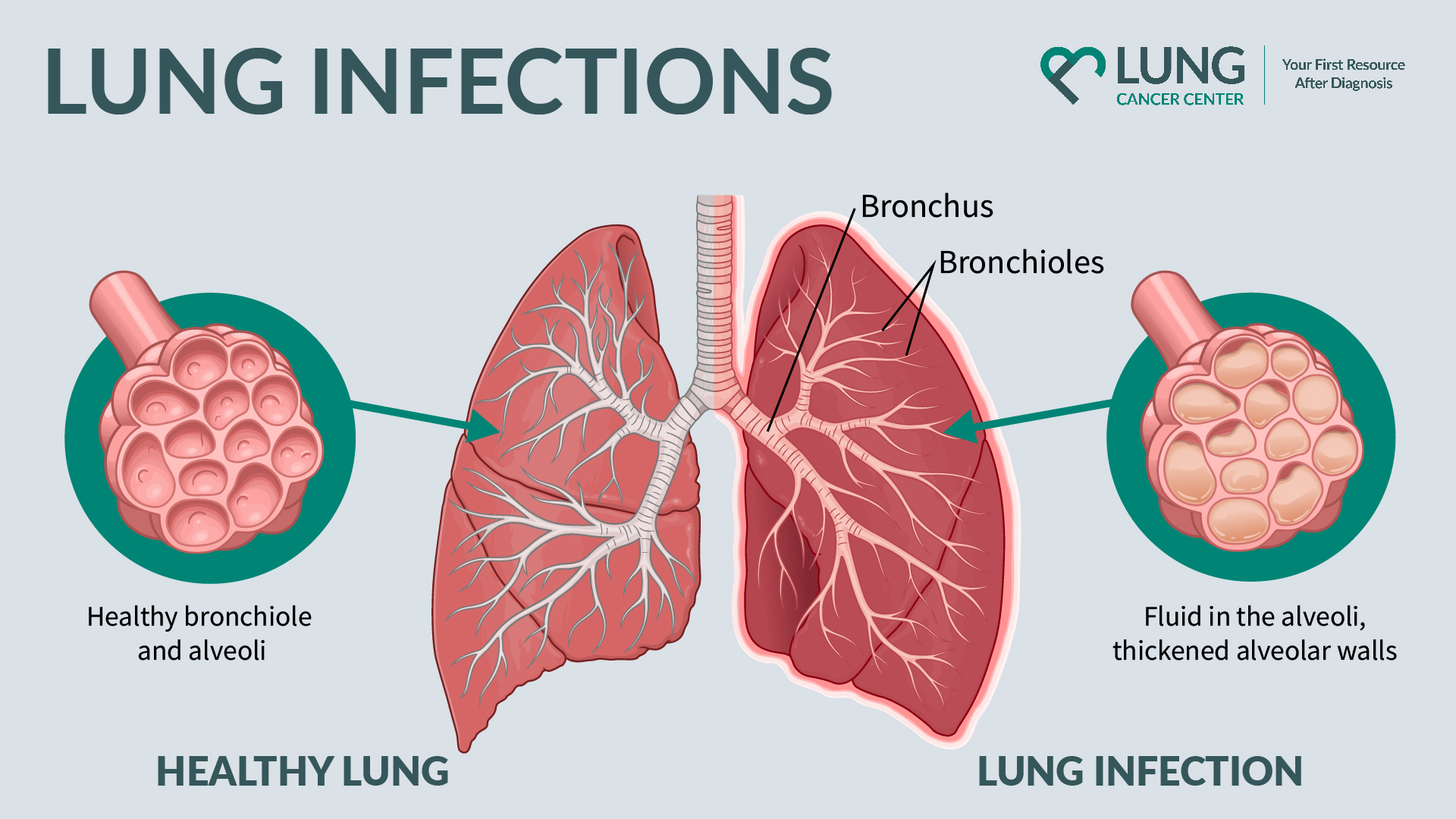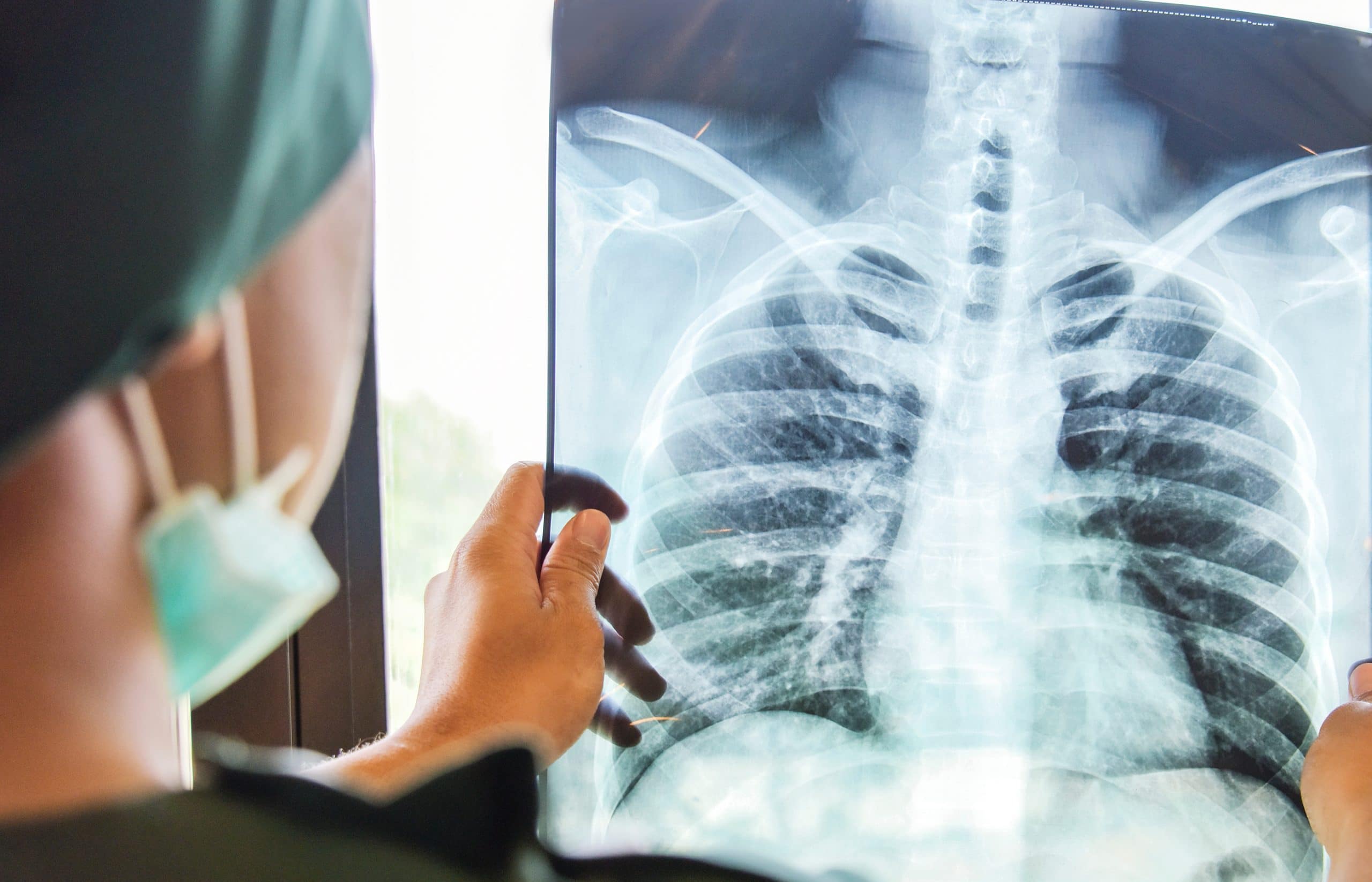Are Lung Infections a Sign of Cancer?
A lung infection, like pneumonia, is a common side effect of lung cancer. Learn how to manage the symptoms, treatment options, and types of lung infections.


Pulmonary Lung Infections and the Respiratory System
For individuals and families battling mesothelioma or lung cancer, lung infections can pose one of the most significant speed-blocks on the pathway toward recovery. Considering that research shows that nearly 50% of people with lung cancer will encounter some form of lung infection, we at Lung Cancer Center thought it was important to bring up this issue and reconnect patients and their families with valuable information that will provide insight and education.
While managing lung infections can be challenging, understanding their potential connection to lung cancer can help medical professionals tailor their treatment approaches. Join us as we delve into the complexities of lung infections and their correlation with lung cancer. Explore the various types of lung infections, available treatment methods, and how infections can impact diseases such as mesothelioma and lung cancer.
Most Common Types of Lung Infections
The most common pulmonary infections that occur among those with respiratory system issues include pneumonia, bronchitis, and bronchiolitis. These pulmonary infections are typically caused by viruses or bacteria and can vary in severity and treatment options due to a number of different risk factors. Additionally, tuberculosis (TB) and influenza, also known as the flu, are other viral respiratory tract infections known to occur.
These lung infections are caused by a range of different things, including bacteria (e.g., pneumonia), viruses (e.g., influenza, bronchiolitis), and even fungi. Pneumonia inflames the lung tissue, often causing cough, fever, and shortness of breath, while bronchitis specifically affects the bronchial tubes, which leads to a cough with or without mucus production. Bronchiolitis, on the other hand, primarily affects young children by inflaming their small airways, causing wheezing and congestion. Tuberculosis (TB) is an infectious bacterial disease that affects the lungs in a way that requires a specific treatment, while influenza is a viral respiratory tract infection caused specifically by the influenza virus.
In short, the biggest differences among each infection come down to what part of the respiratory system is malfunctioning and the associated symptoms. Now that we have identified these common types of lung infections, we will dive into each type and talk about how they affect lung cancer and mesothelioma survival, and the prognosis of the diagnosed patient.
Pneumonia – Inflammation of the Lungs
Pneumonia is one of the most prevalent lung infections according to the CDC, as in 2021, there were an estimated 1.4 million emergency department visits in the United States for pneumonia as the primary diagnosis alone. This type of lung infection was attributed to bacteria such as Streptococcus pneumoniae, Haemophilus influenzae, and Mycoplasma pneumoniae. For patients diagnosed with lung cancer, you also face an increased risk of developing pneumonia compared to individuals in good health. This can come from the side effects of lung cancer treatments and due to the body’s lowered immune system, which makes it difficult to fend off infections. It’s crucial to recognize the symptoms of pneumonia, which can overlap with those of lung cancer:
- Persistent cough, possibly with mucus production
- Fever
- Shortness of breath and wheezing
- Chest pain, particularly noticeable during deep breaths or coughing
5 Ways to Prevent Pneumonia
The earlier you detect pneumonia, the more likely you are to fight pneumonia effectively. Treatment for pneumonia typically involves medications and antibiotics, especially in cases where bacterial infections are identified, however rare that might be. Viral or fungal pneumonia may require different medications specific to combating these pathogens. To keep yourself safe from pneumonia while dealing with mesothelioma and lung cancer, consider these five preventive measures suggested by the experts:
- Wash your hands regularly to minimize the spread of germs.
- Discuss vaccinations with your healthcare provider, especially regarding the pneumococcal vaccine.
- Maintain good oral hygiene to reduce the likelihood of respiratory infections.
- Steer clear of secondhand smoke and other lung irritants that can exacerbate lung health issues.
- Adopt a healthy lifestyle encompassing a balanced diet, sufficient sleep, and stress management practices.
Bronchitis – Bronchial Tube Infection
According to the National Center for Health Statistics, in 2020, there were over 10.5 million outpatient visits for acute bronchitis in the United States. For those unaware, bronchitis is a respiratory illness lung infection characterized by inflammation of the bronchial tubes, the airways that carry air to the lungs. These tubes will become irritated and inflamed, which leads to an excess production of mucus and cough. If any of these sound familiar and are confirmed by a medical professional, you could have one of two types of bronchitis:
- Acute bronchitis: This is the most common type, typically caused by a viral infection (like the common cold) and lasting less than three weeks.
- Chronic bronchitis: This is a long-term condition defined by a cough with mucus production for at least three months in a year and for at least two years in a row. It’s often linked to smoking.
Lung cancer and mesothelioma, when coupled with a lung infection like bronchitis, create a difficult challenge for the body’s defenses, as it not only increases the risk of complications from infections like bronchitis but it also makes it more difficult to combat the cancer itself. Bronchitis can also exacerbate lung cancer symptoms, making breathing even more challenging and reducing the body’s overall oxygen intake, a crucial ingredient for fighting cancer. It’s also important to be cognizant of how bronchitis is caused in the first place, so that you can be on the offensive when it comes to coming to getting to the bottom of your diagnosis.
- Influenza virus
- RSV
- Mycoplasma pneumoniae
- Chlamydia pneumoniae
- Bordetella pertussis
- Others
Bronchiolitis – Smaller Airways Infection
Bronchiolitis is another common pulmonary infection that primarily affects infants and young children, typically under two years old. Bronchiolitis inflames the small airways (bronchioles) of the lungs, causing them to narrow and swell with mucus, making it difficult for the child to breathe. This condition is most commonly caused by respiratory syncytial virus (RSV), although other viruses like adenovirus can also cause this.
Recent US statistics, specifically on bronchiolitis diagnoses, are a bit more difficult to pin down at this time as The Centers for Disease Control and Prevention (CDC) tracks RSV hospitalizations but doesn’t publicly report the exact number of bronchiolitis diagnoses. For patients with mesothelioma and lung cancer, being properly diagnosed and ensuring that your disease is confirmed is important to avoid mistreatment plans.
Symptoms similar to lung cancer include wheezing, cough (which may or may not produce blood or mucus), congestion, fever, difficulty breathing, rapid breathing, and retractions (pulling in of the chest wall muscles with each breath). While bronchiolitis is usually mild, it can pose a serious threat to some babies, especially those born prematurely or with underlying health conditions.
Do you think your lung infection is linked to asbestos exposure? Fill out a free case evaluation form to find out.
Diagnosing a Lung Infection
Diagnosing a lung related infection typically involves an evaluation by a healthcare specialist who starts by reviewing the patient’s medical history and symptoms. The medical professional will then take chest X-rays to help visualize inflammation or fluid buildup within the lungs, while using a pulse oximeter to measure blood oxygen levels. To diagnose a lung infection, doctors use tests like chest X-rays to see if there’s inflammation or fluid and pulse oximetry to check oxygen levels in the blood. They also analyze sputum and blood samples to pinpoint the exact germ causing the infection. For more complex cases, additional procedures like bronchoscopy to collect airway samples or pleural fluid culture may be necessary for a precise diagnosis.
Diagnosing Pleuropulmonary Infections with Cytology
Given that individuals with lung cancer often experience weakened immune systems and physical obstructions from their disease, this risk of respiratory system complications rises dramatically. These complications may pave the way for secondary infections or fungal diseases, complicating treatment and recovery processes. Because the lungs are such a frequent target of infectious diseases, an accurate diagnosis is key in determining what’s going on exactly. Cytology plays a big role in this diagnosis process, as it is used to collect samples that allow doctors to diagnose infections. One of the advantages of cytology is patients can typically expect the results back within a day or so as well as it being minimally invasive compared to other surgical biopsies. Special stains, immune tests, and genetic analysis can further enhance the diagnosis.
A few ways doctors use cytology to diagnose lung infections is that they can collect samples through the mucus emitted from coughing (sputum) or by inserting a thin needle (Lung Fine Needle Aspiration (FNA)) to withdraw a sample of cells from a lung, or by using a bronchoscope for brushings, washings, or fluid collection (Bronchoalveolar Lavage (BAL)). Then, by examining these cell samples under a microscope, specialists can identify white blood cells that point to a specific infection type and sometimes even see the infectious organism itself.
Lung Infections Diagnosis Limitations
While cytology provides rapid results and is less invasive than surgery, it does have limitations. It may not always definitively identify the source of the anomaly, especially when differentiating certain infections or ruling out certain cancers. Additionally, the quality of the sample can impact the overall accuracy. Nevertheless, cytology remains an important player in diagnosing lung and pleural infections, often working alongside other diagnostic methods to paint a complete picture.
Recovering From a Fungal Lung Infection
Lung infections can last a long time if not treated properly. A bacterial lung infection often requires antibiotics to remedy pain and symptoms. If you have a fungal infection, your doctor may prescribe you antifungal medication. On the other hand, if you have a viral infection, you will likely have to wait until your body fights the infection naturally, or the lung infection goes away on its own.
At-home remedies for lung infections include:
- Take acetaminophen
- Stay hydrated
- Drink hot tea
- Gargle salt water
- Stay rested
- Use a humidifier
You may need to visit a hospital for severe lung infections or symptoms associated with lung cancer or mesothelioma. You may need to receive antibiotics, intravenous (IV) fluids, or respiratory therapy. If you have more severe lung cancer symptoms, you may also need palliative treatments. Palliative therapy may include breathwork, meditation, massages for pain, and late-stage curative efforts.
When to See a Doctor for Lung Infections
Several factors could cause a lung infection, including bacteria, fungi, and viruses, but it is also possible that you were exposed at work or through the negligence of a manufacturing company. Whether you are 20 or 80, if you have been exposed to asbestos or other deadly chemicals over time, you may be running the risk of developing lung cancer or mesothelioma. For any symptoms you feel may be connected to any of the mentioned lung infections, we suggest you turn to a medical professional such as your doctor or primary care physician. Only a medical professional can tell you for sure what you are dealing with.
What Lung Cancer Center can help you with is navigating the system and holding those responsible for your diagnosis responsible. We can help connect you to medical professionals and the finest of medical care. If you have been diagnosed with a respiratory or lung issue our patient advocates can help you find therapy and treatment. Additionally, we can answer difficult questions about infection and lung cancer or mesothelioma. Get the help you need by contacting our compassionate and knowledgeable cancer advocates.


